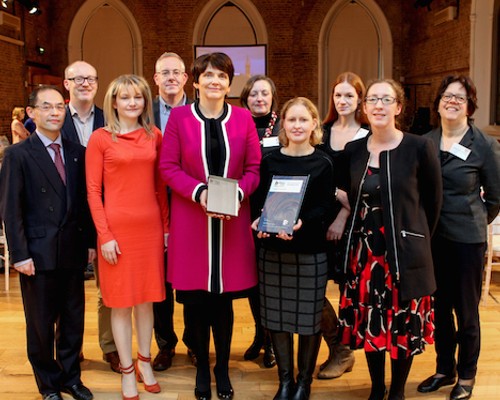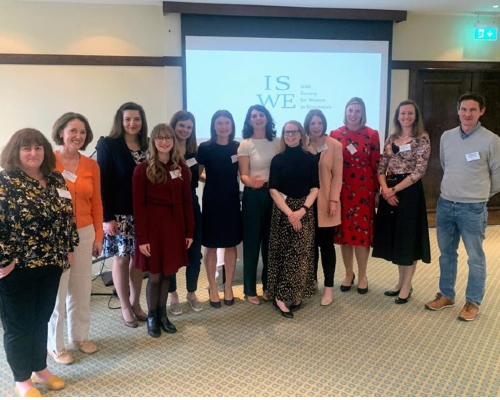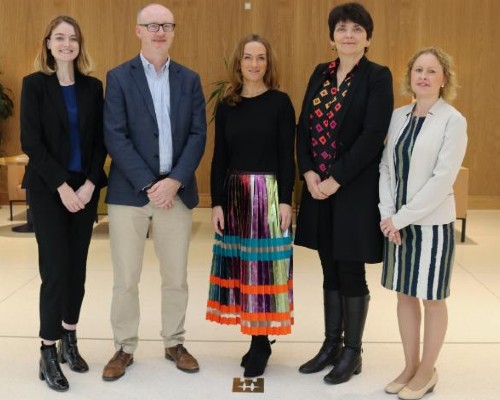The Athena SWAN charter was launched in Ireland in 2015, following a national process led by the Higher Education Authority (HEA) as part of the Government’s strategy for gender equality. Minister for Further and Higher Education, Research, Innovation and Science, Simon Harris called it “one of the most important initiatives in the higher education sector in Ireland.”
A thena SWAN was established in 2005 in the UK to encourage and recognise commitment to advancing the careers of women in science, technology, engineering, maths and medicine (STEMM). The framework evolved and expanded to cover gender equality across all disciplines (including the under-representation of men in some disciplines) as well as professional and support staff in these areas.
thena SWAN was established in 2005 in the UK to encourage and recognise commitment to advancing the careers of women in science, technology, engineering, maths and medicine (STEMM). The framework evolved and expanded to cover gender equality across all disciplines (including the under-representation of men in some disciplines) as well as professional and support staff in these areas.
The intersectionality of gender with other equality grounds is also an important principle of the Athena SWAN framework recognising that people’s identities and social positions are shaped by several factors, which create unique experiences and perspectives – including, among other factors, gender identity and race.
UCD has attained two successive institutional Athena SWAN Bronze Awards, and 24 schools including the entire College of Engineering and Architecture have achieved individual awards.
Professor Orla Feely, recently appointed the next President of UCD – the university’s first woman president – chaired the original Gender Equality Action Group (pictured right) that managed the university’s Athena SWAN submissions over two terms from 2015 to 2020.
She said: “An early focus of attention, nationally as well as within UCD, was the clear underrepresentation of women among the higher academic ranks. To address this, targets in promotions were set based on the pipeline principle: the percentage of women being promoted to a given level should be at least equal to the percentage of women who are eligible to apply for that promotion.”
UCD’s first Gender Equality Action Plan targeted increased numbers of women in senior academic roles across the institution. Today, since the latest Athena SWAN Bronze Award renewal in 2020, the university has seen an increase in women at Professor and Full Professor level, of +10 per cent and +4 per cent, respectively, with female Professor to Full Professor promotions up from 20 percent (in 2020) to 60 per cent as of 2022. In addition, there has been an increase in women at senior grades in professional and administrative roles across UCD.
Increasing representation
Another key element of institutional strategy was to support schools and colleges to undertake the Athena SWAN review process, create an action plan and apply for accreditation.
Associate Professor Orla Doyle was one of the team who undertook that process for UCD School of Economics. “We knew it before we did all the surveys and focus groups and looked at the data; there are fewer women coming into economics. There’s only about one third participation of women in economics in higher education and that is consistent across the pipeline.
“This low participation starts early, in secondary school, and carries on through undergraduate, masters and doctoral programmes, through to the professional sector. So our main challenge is to increase the number of women who study economics and become economists.”
Taking the economics profession as an example, disproportionately missing out on the opportunities it affords deprives women in two ways. Economists are top earners among the professions, attracting salaries on a par with those in medicine. They also occupy positions of power and influence in many important sectors including banking, Government and the media. So an underrepresentation of women in economics is particularly disadvantageous to women as a group, and to society as a consequence.
 “We know that female economists hold different views from male economists, so we’re not getting the necessary diversity of approaches in key decision-making when it’s all male economists working with government departments or working in Government, in policymaking or even working in business. It’s a very male dominated industry,” Associate Professor Doyle said.
“We know that female economists hold different views from male economists, so we’re not getting the necessary diversity of approaches in key decision-making when it’s all male economists working with government departments or working in Government, in policymaking or even working in business. It’s a very male dominated industry,” Associate Professor Doyle said.
To address the problem, the school produced a 50-point action plan designed to attract new entrants and advance the careers and public participation of existing female economists – including events and engagement with second level students to highlight the profession and raise awareness of women’s underrepresentation.
Perhaps the most important development though was the launch of the Irish Society for Women in Economics (ISWE), founded by Orla Doyle (pictured left (centre) at the ISWE strategy launch), to inspire, empower and increase women’s visibility in economics in Ireland.
“This was the biggest thing we did that came out of the Athena SWAN process. ISWE was developed from the UCD School of Economics Athena SWAN action plan and as a nationwide initiative, it’s been really active and really successful.”
A key aim of ISWE is to increase the participation of female economists in public debates, policy decisions, and education so that the impact of the profession is more representative of all of Irish society. To this end, the organisation secured funding for a media training programme for women economists, which includes a ‘budget review’ segment to train them in how to speak publicly on the annual national budget.
“I want to see more female economists in the public eye. Across the media, it’s hard to think of any regularly featured economists who aren’t men. If you asked anyone to name a female economist, they probably couldn’t. So my aim is to change that and that’s partly why we’re doing this media training,” Associate Professor Doyle said.
ISWE also runs an annual prize for economics papers, presented at its annual conference, as well as a mentoring programme for early career economists – in which several UCD faculty including Dr Nora Strecker and Dr Oana Peia serve as mentors.
Becoming truly inclusive
Today, UCD’s gender equality action plans act have broadened well beyond female representation in the higher echelons and supports the delivery of University Strategy and UCD Equality, Diversity and Inclusion (EDI) strategy.
Professor Orla Feely said: “Beyond the numbers, much of the work we’ve done is towards creating a better culture that’s more inclusive and supportive of equality and diversity. Work around dignity and respect, combating bullying, harassment and sexual misconduct, incorporating family friendly practices such as core meeting hours, having gender balance on decision-making committees, maternity and parenting supports including breastfeeding in the workplace, were all important actions in successive Athena SWAN Gender Equality Action plans.”
 Since the last Athena SWAN Bronze Award renewal in 2020, UCD has posted increases in women participating on influential institutional committees: realising a 7 percent increase in women on the Governing Authority (now 58 per cent women to 42 per cent men) and a 13 per cent increase in women on the University Management Team (now 54 per cent women to 46 per cent men).
Since the last Athena SWAN Bronze Award renewal in 2020, UCD has posted increases in women participating on influential institutional committees: realising a 7 percent increase in women on the Governing Authority (now 58 per cent women to 42 per cent men) and a 13 per cent increase in women on the University Management Team (now 54 per cent women to 46 per cent men).
While the university still wants to enhance the participation of women in leadership and public discourse, the next phase is focused on embedding EDI practices and awareness across all university departments and activities, with particular focus on the impact of intersectionality.
Professor Feely said: “I want UCD to be an outstanding and truly inclusive environment for people of all genders, ethnicities, cultures and backgrounds.”
Central to that inclusiveness, the task of driving equality and diversity must fall evenly across the community, and not just on those striving for more equal representation. “The processes of Athena SWAN, for instance, involve a great deal of work, and the time burden associated with this often falls disproportionately to women – particularly those at the early career stage who are very often the ones who put their hands up to take on this work.
“It’s very important to us as an institution that all members of the university community and leadership are involved in our continued improvement. We want to draw on the ideas, the creativity and the contribution of all members of our community to make UCD a truly inclusive environment.”
Image (above right): Eimear O'Reilly, EDI Project Officer, Rory Carey, Director of Culture & Engagement, Dr Rhona Mahony, Professor Orla Feely, Vice-President for Research, Innovation and Impact and Marcellina Fogarty, EDI Manager.
Learn more about the university’s Equality, Diversity and Inclusion strategy and actions by visiting www.ucd.ie/equality.